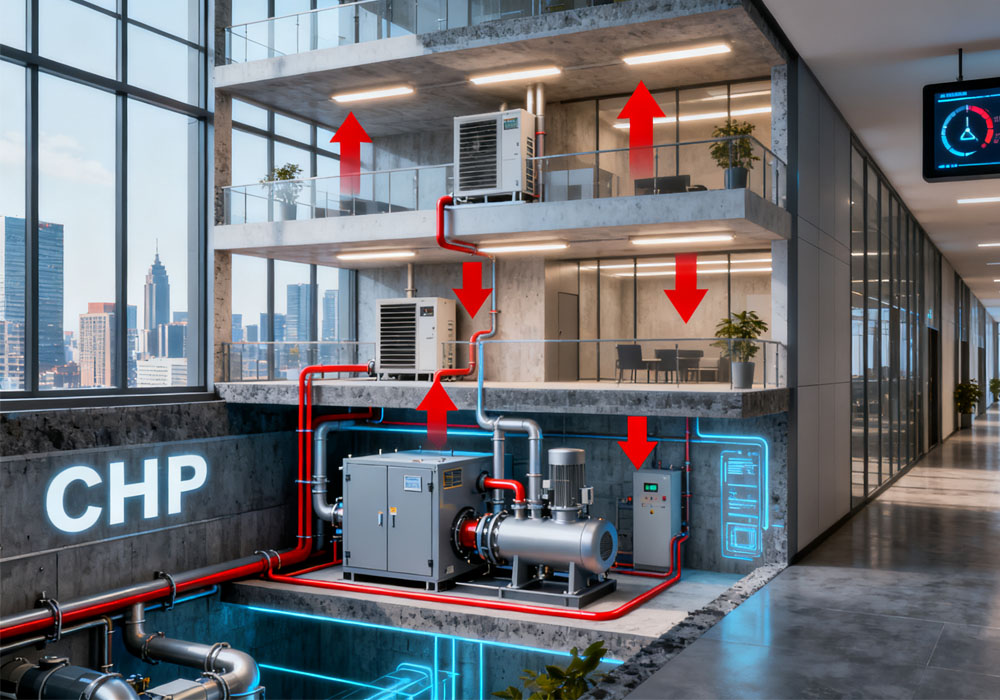The Benefits of CHP Systems for Commercial Use
In today’s energy-conscious world, commercial buildings are constantly seeking ways to reduce energy costs, improve efficiency, and achieve environmental sustainability goals. One technology gaining significant attention in this regard is combined heat and power (CHP) systems, also known as cogeneration.
These systems, which generate both electricity and useful heat from a single fuel, offer significant advantages to commercial organizations. Whether reducing energy costs, improving energy security, or supporting sustainability goals, CHP systems offer powerful solutions for many commercial applications.
This article explores the advantages of CHP systems for commercial use, their potential applications, and factors businesses should consider when integrating them into their operations.
What Are Combined Heat and Power (CHP) Systems?
A Combined Heat and Power (CHP) system is an advanced energy solution that captures and utilizes the heat produced during electricity generation, which would otherwise be wasted in conventional power plants. By capturing this heat and using it for purposes such as space heating, hot water generation, or even cooling, CHP systems are able to operate at efficiencies of up to 90%, compared to the typical efficiency of 50% for traditional energy systems.
CHP systems are designed to generate both electricity and thermal energy simultaneously, using a single energy source such as natural gas, biomass, or waste-derived fuels. This dual production not only maximizes the use of energy but also contributes to a more sustainable and cost-effective solution for commercial operations.

Key Benefits of CHP Systems for Commercial Buildings
The integration of a CHP system into commercial buildings offers a range of benefits, from energy savings to improved environmental performance. Below are some of the most significant advantages of adopting a CHP system:
1. Enhanced Energy Efficiency
One of the primary benefits of CHP systems is their ability to generate both electricity and thermal energy simultaneously, resulting in a dramatic improvement in overall energy efficiency. Traditional energy generation methods typically waste a significant portion of generated energy in the form of heat. CHP systems, on the other hand, capture this waste heat and use it to provide heating or hot water, ensuring that more of the energy produced is used effectively.
In commercial buildings, where both electricity and heating demands are substantial, this combined production can result in up to 90% energy efficiency, compared to the 50% efficiency offered by conventional separate electricity and heating systems. This efficiency translates into lower overall energy consumption, reducing the demand on grid-based power supplies and helping to lower energy costs in the long term.
2. Cost Savings
Cost savings are perhaps the most tangible benefit that commercial buildings experience when they implement CHP systems. By generating electricity on-site, businesses can reduce their reliance on external electricity suppliers and avoid the cost fluctuations associated with purchasing electricity from the grid. In many cases, businesses can sell excess electricity back to the grid, creating an additional revenue stream.
Moreover, since CHP systems also provide heating and hot water, businesses can eliminate or reduce the need for separate heating systems, further reducing operational costs. Over time, the initial investment in a CHP system can be recouped through substantial energy savings, with many systems paying for themselves within a few years. The reduction in energy bills, combined with the potential for income from surplus power, makes CHP systems a financially attractive option for businesses.
3. Reduced Greenhouse Gas Emissions
The environmental benefits of CHP systems are significant. By improving energy efficiency and reducing the amount of fuel required to generate both electricity and heat, CHP systems can substantially reduce greenhouse gas emissions. In comparison to conventional energy systems, which release large amounts of carbon dioxide (CO2) and other pollutants, CHP systems offer a cleaner, more environmentally friendly energy solution.
Businesses that implement CHP systems contribute to their corporate sustainability goals and help reduce their carbon footprint, making them more competitive in an increasingly eco-conscious market. Additionally, many green building certifications offer credits for businesses that implement energy-efficient technologies like CHP, further incentivizing their adoption.
4. Improved Energy Resilience
In an increasingly unpredictable world, energy resilience has become a critical concern for businesses. Power outages, peak demand periods, and grid instability can disrupt operations and impact productivity. CHP systems help mitigate these risks by providing reliable, on-site power generation. In situations where external electricity supply is unreliable, a CHP system can maintain power, ensuring continuous operations.
For commercial buildings that require round-the-clock operations—such as hospitals, data centers, or manufacturing plants—a CHP system can provide a constant and reliable energy source, ensuring minimal disruption to business activities. By generating power on-site and providing backup energy during grid outages, CHP systems enhance a business’s ability to function independently of the grid.
5. Support for Sustainability Goals
As sustainability becomes an increasingly important focus for organizations worldwide, CHP systems provide a strategic way for businesses to meet their environmental objectives. By adopting CHP systems, businesses can significantly reduce their carbon emissions, lower their energy consumption, and improve their overall environmental impact.
Many organizations are actively seeking ways to reduce their carbon footprint and achieve sustainability certifications. CHP systems, with their efficiency and environmental benefits, help businesses meet green building standards, carbon reduction targets, and regulatory compliance for emissions.

Applications of CHP Systems in Commercial Settings
CHP systems are versatile and can be used across a variety of commercial sectors. Their primary benefits are realized in applications that require consistent and substantial energy input. Some of the key industries and settings where CHP systems are commonly implemented include:
Office Buildings: For large office complexes, CHP systems provide reliable electricity and heating while significantly reducing energy costs and environmental impact.
Hospitals: With high energy demands for lighting, heating, cooling, and medical equipment, hospitals benefit from the reliability and efficiency of CHP systems. Ensuring uninterrupted power is critical in healthcare, where power failure can affect patient care.
Hotels and Resorts: These buildings require extensive lighting, HVAC systems, and hot water. CHP systems provide a cost-effective, reliable solution to meet these needs while reducing energy expenses.
Industrial Facilities: Many manufacturing operations rely on both electricity and process heat. A CHP system can meet these needs in a highly efficient manner, reducing operating costs and improving energy independence.
Retail and Commercial Complexes: Shopping malls and retail centers, which require consistent lighting and climate control, can benefit from CHP systems by improving energy efficiency and reducing costs.
Factors to Consider Before Implementing a CHP System
Before installing a CHP system, commercial buildings should carefully consider several factors:
Energy Demand Profile: Assessing the energy needs of the building is crucial to determining whether a CHP system is a suitable solution. CHP systems are most effective in buildings with a consistent and high energy demand for both electricity and thermal energy.
Fuel Availability: CHP systems rely on fuels like natural gas or biomass. The accessibility and cost of these fuels in a particular region can impact the long-term viability and operational cost-effectiveness of the system.
Initial Investment: While CHP systems offer significant long-term savings, the upfront cost can be high. Businesses should consider the total cost of installation, including equipment, labor, and permits, and evaluate the return on investment (ROI) over time.
Regulatory Compliance: Depending on the region, businesses may need to comply with local regulations regarding emissions, waste disposal, and grid connection. It’s important to ensure that the CHP system meets all required standards and obtains necessary permits.
Conclusion
Combined Heat and Power (CHP) systems offer a comprehensive energy solution for commercial buildings, providing substantial benefits in terms of energy efficiency, cost savings, environmental sustainability, and energy resilience. By harnessing both electricity and heat from a single energy source, CHP systems reduce waste, lower energy consumption, and improve a building’s overall energy profile.
For businesses looking to reduce operational costs, enhance energy independence, and meet sustainability goals, CHP systems provide an ideal solution. With proper planning and consideration of energy needs, fuel sources, and regulatory requirements, businesses can effectively integrate CHP technology to improve efficiency, reduce environmental impact, and gain a competitive edge in an increasingly energy-conscious world.
